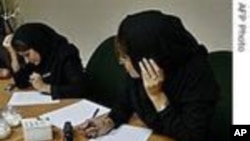The press freedom organization Reporters Without Borders has called Iran "the Middle East's biggest prison for journalists." In 2007, more than fifty journalists were jailed with ten currently behind bars. At least one, Adnan Hassanpour, has been sentenced to death.
But there are additional ways to strangle an independent press, as an article in the on-line daily journal Rooz, recently noted. The author, Hasan Yousefi Eshkevari, writes that never before have journalists faced as much pressure from the regime as they now are experiencing. The Iranian authorities, he says, are exercising multiple levers of power "to aid their supporters and affiliates and to limit others, if necessary, even to drive them into bankruptcy and out of competition."
Financial assistance in the form of grants, expensive advertising, and cheap paper are given to newspapers and magazines espousing the government line. Permits are denied, and rigorous censorship applied to those who dare offer dissenting views. Many media outlets critical of the government have been shut down. "The bitter truth," writes Mr. Eshkevari, "is that the writers, journalists and artists of this land are slowly and silently silenced and destroyed."
Freedom of the press is a vital foundation of successful societies. Governments cannot be responsive to the will of their people without the free flow of information and ideas. The Universal Declaration of Human Rights, which Iran has ratified, is clear: "Every one has the right to freedom of opinion and expression; this right includes freedom to hold opinions without interference and impart information and ideas through any media and regardless of frontiers."
It is time the Iranian regime applies the international norms it purports to support and release its stranglehold on Iran's independent media.
But there are additional ways to strangle an independent press, as an article in the on-line daily journal Rooz, recently noted. The author, Hasan Yousefi Eshkevari, writes that never before have journalists faced as much pressure from the regime as they now are experiencing. The Iranian authorities, he says, are exercising multiple levers of power "to aid their supporters and affiliates and to limit others, if necessary, even to drive them into bankruptcy and out of competition."
Financial assistance in the form of grants, expensive advertising, and cheap paper are given to newspapers and magazines espousing the government line. Permits are denied, and rigorous censorship applied to those who dare offer dissenting views. Many media outlets critical of the government have been shut down. "The bitter truth," writes Mr. Eshkevari, "is that the writers, journalists and artists of this land are slowly and silently silenced and destroyed."
Freedom of the press is a vital foundation of successful societies. Governments cannot be responsive to the will of their people without the free flow of information and ideas. The Universal Declaration of Human Rights, which Iran has ratified, is clear: "Every one has the right to freedom of opinion and expression; this right includes freedom to hold opinions without interference and impart information and ideas through any media and regardless of frontiers."
It is time the Iranian regime applies the international norms it purports to support and release its stranglehold on Iran's independent media.













